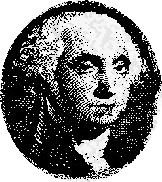

THE FIRST PRESIDENT
In our days it is not possible to foretell absolutely who will be our next President; only the coming together at the polls of the great political forces of the nation can determine it. In 1789 the case was different. All eyes turned instinctively to the great chieftain who led the armies to victory, and who had shown himself a statesman as well as a soldier. The electoral colleges were made up of men chosen by the different states, mostly by the legislatures. The old Congress had decided that the electors be chosen on the first Wednesday in January, 1789, that they meet and choose a President and a Vice President on the first Wednesday in February, and that the new government go into operation on the first Wednesday in March--which happened that year to be the fourth.1 North Carolina and Rhode Island had not yet joined the Union; New York had trouble in her legislature and failed to choose electors; the first President was therefore elected by the votes of ten states. Washington received the votes of all--sixty-nine. The rest of the votes were scattered among eleven men, and John Adams, receiving the highest number, thirty-four, was declared Vice President.2
 Washington was doubtless ambitious, as other men are; but he had reached the goal. No other man of his age had won so great a fame, and now at the approach of old age he had retired to his rural home on the banks of the Potomac, desiring to spend there the remainder of his days, as his private correspondence shows. But the call of a whole people to this new duty he could not decline.
Washington was doubtless ambitious, as other men are; but he had reached the goal. No other man of his age had won so great a fame, and now at the approach of old age he had retired to his rural home on the banks of the Potomac, desiring to spend there the remainder of his days, as his private correspondence shows. But the call of a whole people to this new duty he could not decline.
The 4th of March came, and the boom of cannon and the ringing of bells sounded the knell of the old government that was dying, and announced the ushering in of the one that was being born. New York City had been chosen as the first temporary capital, and thither repaired the newly elected members of Congress. But the distances for many were long, and the roads at that season were wretched. There was not a quorum present on the 4th of March. It was not until the 1st of April that the new House held its first session, the Senate meeting five days later. The first business was going through the formality of notifying the newly chosen President and Vice President of their election. This done, Congress fell to discussing a tariff measure; but the discussion was soon interrupted by the inaugural ceremonies.
Adams, arriving first, was quietly inaugurated on April 18. Washington's journey from his Mount Vernon home to New York was like a triuphal march. The people gathered in uncounted numbers along the route to do honor to the hero. At Philadelphia and Trenton the most elaborate preparations were made for his reception.3 Reaching Elizabeth Point, in New Jersey, he was met by many distinguished citizens, and with an improvised fleet, Washingtonin the midst on a barge built for the occasion, they swept up the beautiful bay on that sunny thursday to greet the expectant city. New York had donned holiday dress. The streets were thronged, and thousands were gathered along the wharf at the Battery, eagerly awaiting the approaching vessels. As Washington stepped from the barge he was greeted with an outburst of welcome, that spread like a rolling billow over the city.
One week later, on Thursday, April 30, the inauguration took place at Federal Hall, on the corner of Broad and Wall streets. At noon Washington, accompanied by Livingston and Adams, stepped out on the balcony and stood in the presence of a vast multitude that filled the streets, the housetops, and the windows, and the cheers that arose were deafening. Just behind him stood Hamilton, Roger Sherman, and three Revolutionary generals--Knox, Steuben, and St. Clair,--and these were followed by both houses of Congress. Livingston pronounced the oath of office; Washington bowed and kissed the Bible, and said in a deeply solemn and scarcely audible voice, "I swear, so help me God." His countenance was grave almost to sadness, reported an eyewitness. Livingston turned to the crowd, waved his hand, and shouted "Long live George Washington, President of the United States"; and the voice of the multitude rose in cheer after cheer, the artilley roared from the battery, and bells were rung all over the city. Thus was the United States of America, under its first President, launched upon the ocean of national life.
Footnotes
1A few years later the 4th of March was made the legal inauguration day by act of Congress.Return
2The Constitution directed that each elector vote for two persons without designating which should be President or Vice President. This was changed by the Twelfth Amendment, of 1804, which provides that the President and Vice President be elected separately.Return
3For a fuller account see Elson's "Side Lights," Vol. I, Chap. III.Return
The Constitution, Created May 7, 2000, by Kathy Leigh Copyright 2003
This website is maintained by Nathan Zipfel